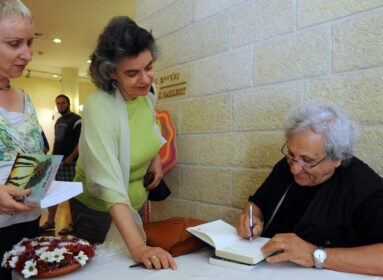Torah Portion – Hukkat
By Shlomo Riskin
Why was Moses, the greatest prophet who ever lived and who sacrificed a princedom in Egypt to take the Hebrews out of Egypt, denied entry into the land of Israel? Was it because he struck the rock with his staff rather than having spoken to it? But it was God, after all, who commanded him to “take the staff, gather together the witness-congregation, and speak to the rock” (Num. 20:8)! And previously, shortly after the splitting of the Reed Sea, but before the Revelation at Sinai, God had commanded him to strike the rock with his staff to bring forth water for the nation (Ex. 17:5).
The key to our understanding of the incident of the rock lies in a curious contrast between Moses and Aaron, hinted at in our Biblical text, which highlights the profound tragedy – as well as the exalted majesty – within the unique persona of Moshe Rabbeinu, Moses our teacher.
Our Biblical portion of Hukkat also records the death of Aaron the High Priest: “And Aaron died there at the top of the mountain… and the entire house of Israel wept over Aaron for thirty days” (Num. 20:28-29). At the conclusion of the Pentateuch and amidst great praise, the text teaches regarding Moses’ passing: “and the children of Israel wept over Moses at the plains of Moab for thirty days” (Deut. 34:8); with Rashi commenting (ad loc), “the children of Israel refers to the males, but regarding Aaron it was written ‘the entire house of Israel wept’, which includes the females; this was because Aaron pursued peace between neighbors and between husbands and wives.” Apparently, Aaron was a more popular religious leader than was Moses.
The Bible also hints at the reason for this. In the beginning of the Book of Exodus, after the occurrence of the burning bush, whenever God proposes that Moses assume leadership over Israel, the prophet is reluctant to do so. “I am not a man of words… I am heavy of mouth and heavy of tongue” (Ex. 4:10 – Kevad Peh, Kevad Lashon), he demurs, usually understood to mean that he stutters and stammers. Indeed, a bit later on the Bible reports that the people do not listen to Moses “because of impatience and hard work” (ibid. 6:9) — usually interpreted to mean that the enslaved and persecuted Hebrews were so embroiled in their toil and suffering that they lacked the patience and vision to hear Moses’ goal, to even dream of freedom and independence.
Rav Levi ben Gershon, philosopher and Biblical commentary (Languedoc, France 1288-1344), takes the text differently: The Hebrews do not listen to Moses because of his impatience and hard work (avodah, Divine service). Moses was a prophet, a master in jurisprudence, a philosopher-theologian; he had spent 60 years in Midian – ‘far from the madding crowds’ – attempting to come close to God, and he was continually developing his intellectual and spiritual powers so that his “active intellect” (seikhel ha’po’el) could “kiss” God’s active intellect, so that he could divine God’s will and communicate God’s Torah to the Israelites (Maimonides, Guide to the Perplexed 2: 32, 45).
Moses recognized his own prophetic potential in the realm of the intellectual and spiritual; he craved and gloried in his fellowship with the Divine. But he also realized that to be a leader of the people you must be a superb shepherd of your flock, you must get into the details of their daily lives, and you must be involved in the often petty arguments between neighbors — picayune problems between husbands and wives. This requires the patience of ‘small-talk’ and human camaraderie, whereas Moses could reach the level of communicating God’s Torah only because his soul constantly yearned for ‘heavy-talk’ — God-talk. Moses knew he would not have the patience to win over the nation to his side by drinking l’chaim with them and dancing at their weddings.
Hence, God suggests to Moses that Aaron “be his spokesman to the people, that [Aaron] be his mouth [for small talk]” (Ex. 4:15). Moses succeeded in communicating a Divine Torah for the generations, but failed in convincing the Hebrews to conquer Israel in his generation. For, you see, the contrast between Moses the man of God and the necessity for a person of the people become only greater with every passing year in the desert. After all, in the beginning everyone felt only gratitude to the individual who removed their pain of enslavement. But unfortunately, such gratitude barely survives the first dearth of water. And so, when Korah rebels, not one Hebrew stands up for Moses, and when the prophet asks to meet “in his office’ with Datan and Aviram, they refuse to come!
So when the Hebrews again kvetch for water, God tells Moses to take his staff of leadership not to strike in punishment the hard, stiff-necked rock which symbolized ungrateful Israel, but rather to speak to the Hebrews with words of love and the empowerment of the leniency and softness of the Oral Law which will and must emerge from them as they continue to mature, as they partner with God in completing both His Torah and His World (Rabbenu Tzadok).
But alas, the ungrateful nation has worn Moses down; he can only strike them (the rock) in frustration and refer to them as rebels. And since Moses can no longer love and empower Israel with loving words of the Oral Law, Moses’ leadership must end in the desert.
Rabbi Shlomo Riskin is chancellor of Ohr Torah Stone and chief rabbi of Efrat, Israel.








 Southern New England Jewish Ledger
Southern New England Jewish Ledger










